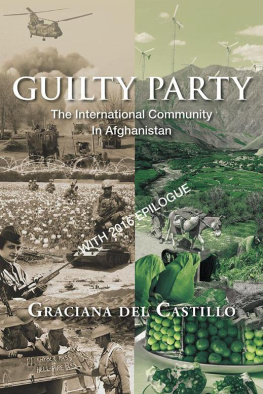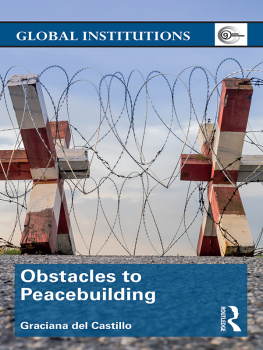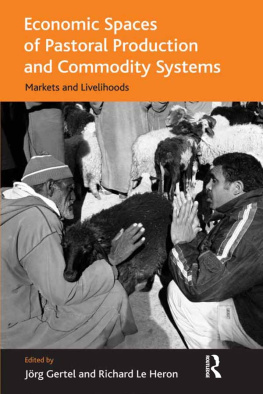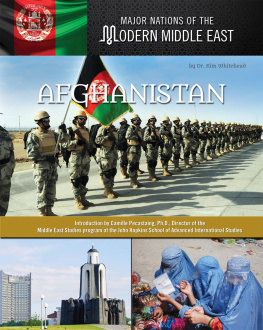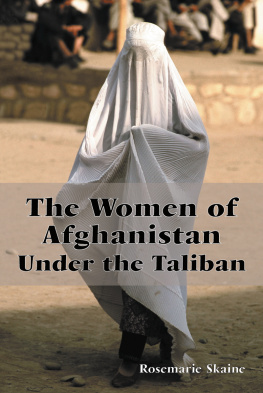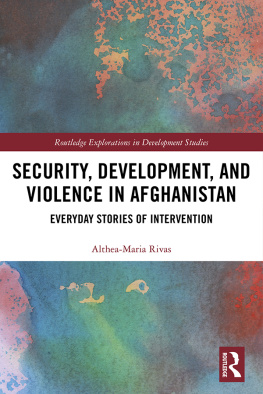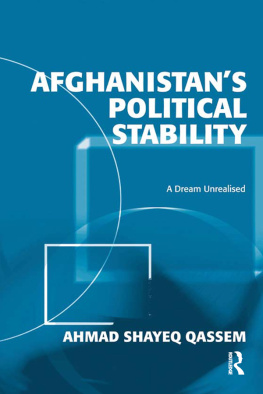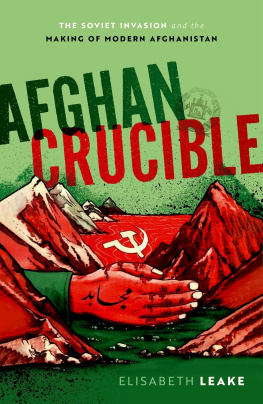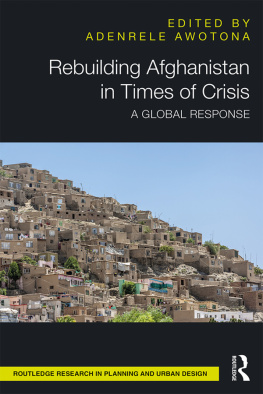Guilty Party
The International Community in Afghanistan
With New 2016 Epilogue
Graciana del Castillo
Copyright 2014 by Graciana del Castillo.
Library of Congress Control Number: 2014905484
ISBN: Hardcover 978-1-4931-8571-9
Softcover 978-1-4931-8572-6
eBook 978-1-4931-8570-2
All rights reserved. No part of this book may be reproduced or transmitted in any form or by any means, electronic or mechanical, including photocopying, recording, or by any information storage and retrieval system, without permission in writing from the copyright owner.
Any people depicted in stock imagery provided by Thinkstock are models, and such images are being used for illustrative purposes only.
Certain stock imagery Thinkstock.
Second edition: 06/20/2016
Xlibris
1-888-795-4274
www.Xlibris.com
Contents
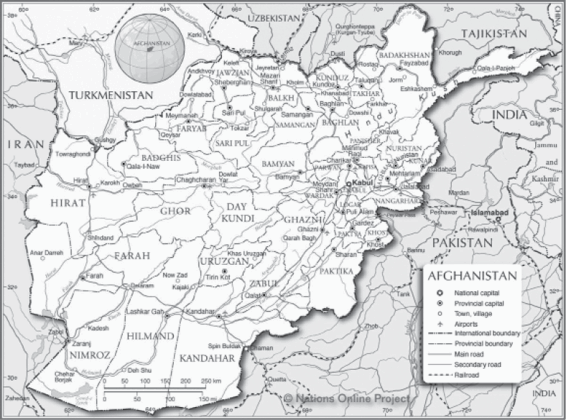
SOURCE: UN Cartographic Section, Nations Online Project.
To my mentor and friend, Nobel Laureate Robert A. Mundell, University Professor and Professor of Economics at Columbia University
To Professors M. Ishaq Nadiri and Barnett R. Rubin who taught me so much about Afghanistan
To all those that contributed to this book with their knowledge and wisdom, as well as with specific comments and suggestions, for which I am most grateful
Advance Praise for
Guilty Party: The International Community in Afghanistan
With one of the clearest minds of her generation of development economists, Graciana del Castillo has come up with the most exciting book of the decade showing how sustainable growth rather than war is the answer to extremism, insurgency and poverty. Using Afghanistan as her template she writes a brilliant, lucid account of what went wrong and how it can be fixed. Guilty Party should become the Bible of politicians, generals and economists who have to grapple with global problems.
Ahmed Rashid, best-selling author of The Taliban (2001), Descent into Chaos (2008)
and Pakistan on the Brink: The Future of America, Pakistan and Afghanistan (2012)
This book offers a long view of Afghan history and a wide view of recent state-building interventions to help us understand the tragic and wasteful failures of international efforts in Afghanistan since 2001. From these hard lessons, Graciana del Castillo works to build a new paradigm for the vital economics of peace and reconstruction that applies in critical periods of transition between war and normal economic development.
Roger B. Myerson, Glen A. Lloyd Distinguished Service Professor, University of Chicago.
Winner of the 2007 Nobel Prize in Economics
Guilty Party offers a unique perspective informed not only by the authors expertise as an economist, but also by her knowledge of and exposure to the countrys historical complexities. She has seen two Afghanistans, both of which are firmly alive in the mind of all Afghans: the pre-war Afghanistan, which was characterized by tolerance, moderation, and a quest towards modernization, and the post-war Afghanistan, which has been plagued by conflict, violence and the destructive shadow of fanaticism that tore the country apart. Understanding the realities of the recent past, particularly the last 30 years, Graciana del Castillo lays a conceptual grid on efforts to rebuild the country after the Taliban. Her book is a cool dismissal of the existing development narrative that is in dire need of rethinking. It is an original, provocative, and passionate account that can inform the debate on the future of international communitys involvement in Afghanistan as the country enters a new phase in its history and embarks towards its transformation decade.
Ambassador Zahir Tanin, Permanent Representative of Afghanistan to the United Nations, New York
Graciana del Castillo, an eminent authority on the economics of failed states, has produced what will be the biggest bombshell of the Afghan reconstruction period. Indeed, del Castillo reveals that Afghanistan has truly become Obamas war, with 75 per cent of the Afghan war tab being racked up since President Obama assumed office. In Guilty Party , the factoids surrounding Afghanistan are swept away and replaced by facts.
Steve H. Hanke, Professor of Applied Economics, The Johns Hopkins University
Guilty Party takes a steely-eyed look at more than ten years of ineffective peacebuilding in Afghanistan. Drawing on Afghanistans long history of failed international intervention, it exposes the mistakes made time and again by the international community. By failing to focus on the economic reconstruction that is necessary to establish a sustainable Afghan economy and state, Afghanistans international partners have left it vulnerable to collapse. Written by one of the best-informed and most experienced scholars of peacebuilding, this book is must reading for those who want to understand what went wrong and what can (still) be done to assist Afghanistan in promoting a sustainable peace.
Michael W. Doyle, Director of the Columbia Global Policy Initiative and Harold Brown Professor of
International Affairs, Law and Political Science, Columbia University
Guilty Party is a fresh approach to the centrality of economic issues in the midst of war. Its differentiation between normal development policy and what is needed in conditions of stability and reconstruction bear thinking about by development, aid and NGO officials alike. So too does the critique of the UN which often finds its tools and bureaucratic realities are no match for its assigned or assumed responsibilities; a problem both UN officials and international policy makers need to take seriously.
Ambassador Ronald Neumann, U.S. Ambassador to Afghanistan (2005-07).
President of the American Academy of Diplomacy
Guilty Party is a carefully researched book and brilliant expos that must be read by those seeking to understand how the international community failed in Afghanistan. The book not only provides a devastating critique of reconstruction and development policies, of the neglect of the agricultural sector and of the failure to improve the lives of the local population, but it contains innovative proposals on how to promote inclusive growth in Afghanistan as international aid decreases and foreign forces depart.
Francesc Vendrell, Special Representative of the European Union for Afghanistan (2002-08).
Personal Representative of the Secretary-General and Head of the UN Special Mission for Afghanistan (2000-02)
This is a significant and penetrating book on Afghanistan that skillfully and perceptively combines history, security, political and economic challenges and tragedies that Afghans have faced in the past thirty five years. It is the misguided design and the enormously wasteful and ineffective execution of programs by the international community to stabilize Afghanistan that constitutes the core of the book. The path not taken is clearly described by advocating a skillful design for the reconstruction of the Afghan economy and arguing for effective use of foreign assistance, which are the fundamental prerequisites of eventual peace and stability of the country and the region. Policy makers, international and Afghan bureaucracies as well as the international press will find Guilty Party highly instructive if they are serious in assisting the Afghan people to find the peace and stability that they so highly deserve.
M. Ishaq Nadiri, Senior Economic Advisor to President Karzai (2005-2008).
Jay Gould Professor of Economics, New York University.
In this book, Graciana del Castillo provides a penetrating analysis of a country whose tragedy is set to continueunless the international community acts swiftly, and absorbs the lessons that the author so cogently sets out. Guilty Party is far more than a critique; it provides timely and practical policy recommendations, including the innovative idea of reconstruction zones which can build the economy of Afghanistan, a precondition for eventual peace.
Next page
